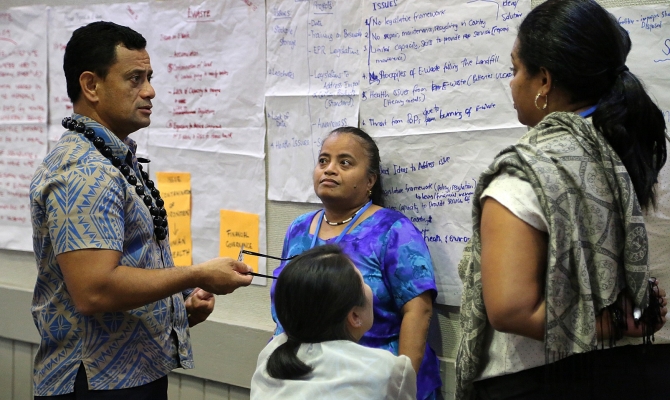News - Apr 21, 2021 Pacific Islands Identify Waste Management Priorities

Participants from across the Pacific region gathered in Nadi, Fiji to discuss and decide on national and regional priorities to guide the implementation of the Pacific-European Union Waste Management Programme (PacWaste Plus) for sustainable waste management in the Pacific.
The three-day meeting, which ran from 27 to 29 May 2019, was the first in a series of regional meetings, workshops and training to be undertaken by the PacWaste Plus Programme to identify and resource actions to address waste issues in the region.
The programme is funded by the European Union (EU) and implemented by the Secretariat of the Pacific Regional Environment Programme (SPREP), and focuses on building the capacity of Pacific islands to manage waste in an environmentally sound manner, which will have a positive impact on not only the health and livelihoods of our Pacific people but also for Pacific environments and economies.
The Team Leader of Climate Change, Energy, and Circular Economy of the Delegation of the EU for the Pacific, Mr Adrian Nicolae, stated that the EU is committed to assisting the Pacific region build its capacity to address sustainable waste management.
“The EU is dedicated to supporting the Pacific island countries in cost-effective and sustainable management of waste bring not only environmental but also economic benefits for the countries. Through PacWaste Plus programme we will also support and strengthen regional cooperation, where countries will share their experiences and best practices in the sector.”
The priority types of waste identified during the meeting include asbestos, e-waste, healthcare waste, recyclables, organic waste, disaster waste, bulky waste, and wastewater impacted by solid waste.
PacWastePlus, building on the experience and lessons learned from the first project (PacWaste, which ended in 2018), will assist the countries in improved data collection and sharing, assessing the legal frameworks and waste policies, enhancing private sector engagement, infrastructure development, and capacity of countries to deliver sound environmental waste management practices across the Pacific.
PacWastePlus Programme Manager, Mr Bradley Nolan said, “We understand that while the challenges identified may be similar across our Pacific islands countries, in order for this project to be successful, the solutions must be tailored and delivered in activities that are country-specific and why we have stressed throughout the meeting both the EU and SPREP’s commitment to working closely with them.”
The work of the programme is being guided by and will support, the delivery of actions included in the Pacific Regional Waste and Pollution Management Strategy 2016-2025 (Cleaner Pacific 2025). The strategy outlines the importance of proper waste management and pollution control in the Pacific and is the region’s guiding framework put in place to deal with hazardous waste and chemicals.
The PacWastePlus Programme, once successfully implemented, will generate improved economic, social, health, and environmental benefits for Pacific island countries and their communities.
The Programme will run until June 2023 and utilise donor investment of 16.5 million Euros to progress waste management works in the Cook Islands, Democratic Republic of Timor-Leste, Federated States of Micronesia, Kiribati, Nauru, Niue, Fiji, Republic of Marshall Islands, Palau, Papua New Guinea, Samoa, Solomon Islands, Tonga, Tuvalu, and Vanuatu.

